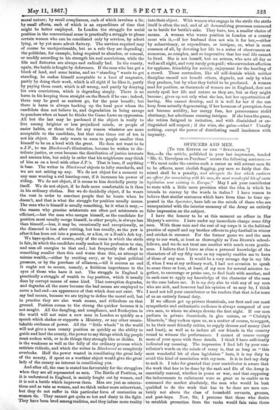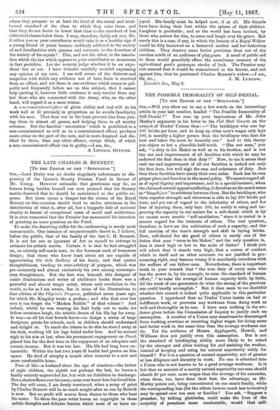OFFICERS AND MEN.
[To THE EDITOR OF THE " SPECTATOR2] SIR,—In the article, published in your last impression, headed "Mr. G. Trevelyan on Purchase" occurs the following sentence:— " We must make the service such a career as will attract men fit to be officers, must abolish flogging, pay men so fairly that dis- missal shall be a penalty, and abrogate the law which cashiers an officer for associating with his men, the most wonderful bit•of caste legislation now existing in Europe." May I ask your contributor to state with a little more precision what the idea is which he intends to convey by the words in italics ? I have reason to believe that similar sentences which have from time to time ap- peared in the Spectator, have left on the minds of those who are unacquainted with the interior economy of the Army an entirely false impression on the subject.
I have the honour to be at this moment an officer in Her Majesty's service. I have under my immediate charge some fifty men. With those men and the rest of my corps it is the habitual practice of myself and my brother officers to play football in winter and cricket in summer. For the former game we and the men strip to our work, at least as thoroughly as Tom Brown's school- fellows, and we do not treat one another with much more gentle- ness. I believe that I have as close a personal knowledge of the characters of all my fifty men as my capacity enables me to have of those of any men. It would be a very strange day in my life if, when I was at my ordinary work, I had not occasion to speak to some three or four, at least, of my men for several minutes to- gether, to encourage or praise one, to find fault with another, and in each case to apply my knowledge of the character of the man to the case before me. It is my duty also to visit any of my men who are sick, and however bad his opinion of us may be, I think I need not tell your contributor or his readers that that is for none of us an entirely formal duty.
If we officers get up private theatricals, our first and our most sympathetic and enthusiastic audience is always composed of our own men, to whom we always devote the first night. If our men perform in private theatricals, in glee unions, or " Christy's Minstrels," they reckon upon us, as a matter of course, to suggest, to be their most friendly critics, to supply dresses and money (last and least), as well as to induce all our friends in the country round to witness the performance. I cannot of course occupy more of your space with these details. I think I have sufficiently indicated my meaning. The impression I find left by your con- tributor's words on the minds of many is, that as long as "this most wonderful bit of class legislation" lasts, it is my duty to avoid this kind of association with my men. It is in fact my duty to seek it. I take for granted that your contributor is aware that the work that has to be done by the rank and file of the Army is essentially manual, whether in peace or war, and that supposing- the inducements to enlistment were so great as to enable us to command the market absolutely, the men who would be best qualified to do the work that has to be done are men- cer- tainly not above the class of household servants, grooms, and post-boys. Now, Sir, I presume that those who desire to establish promotion from the ranks would fain raise those whom they promote to at least the leiel of the moral and intel- ]ectual standard of the class to which they raise them, and that they do not desire to lower that class to the standard of less cultivated classes below them. I may, therefore, fairly ask you, Sir, if either you or your contributor would take it as a healthy sign if a young friend of yours became suddenly addicted to the society of and familiarities with grooms and servants, to the desertion of the society of his equals ? This, and not the other, is the associa- tion which the law which appears to your contributor so monstrous in fact prohibits. Let the country judge whether it be an expe- dient law or not. I have hitherto carefully avoided expressing any opinion of my own. I am well aware of the distrust and suspicion with which any evidence not of bare facts is received from an officer, and yet there is one evidence which comes so pal- pably and frequently before me on this subject, that I cannot help quoting it, however little credence it may receive from any but those who are connected with the Army, who, on the other hand, will regard it as a mere truism.
A non-commissioned officer of given ability and zeal will do his work well or ill precisely in proportion as he avoids familiarity with his men. That does not in the least prevent him from join- ing them in almost all games, and helping them in all worthy schemes. But the familiar 'association' which is prohibited to a min-commissioned as well as to a commissioned officer, produces more crime on the part of the men, and is more despised and dis- liked by them, than any other offence, except drink, of which a non-commissioned officer can be guilty.—I am, &c., A LIBERAL OFFICER.































 Previous page
Previous page